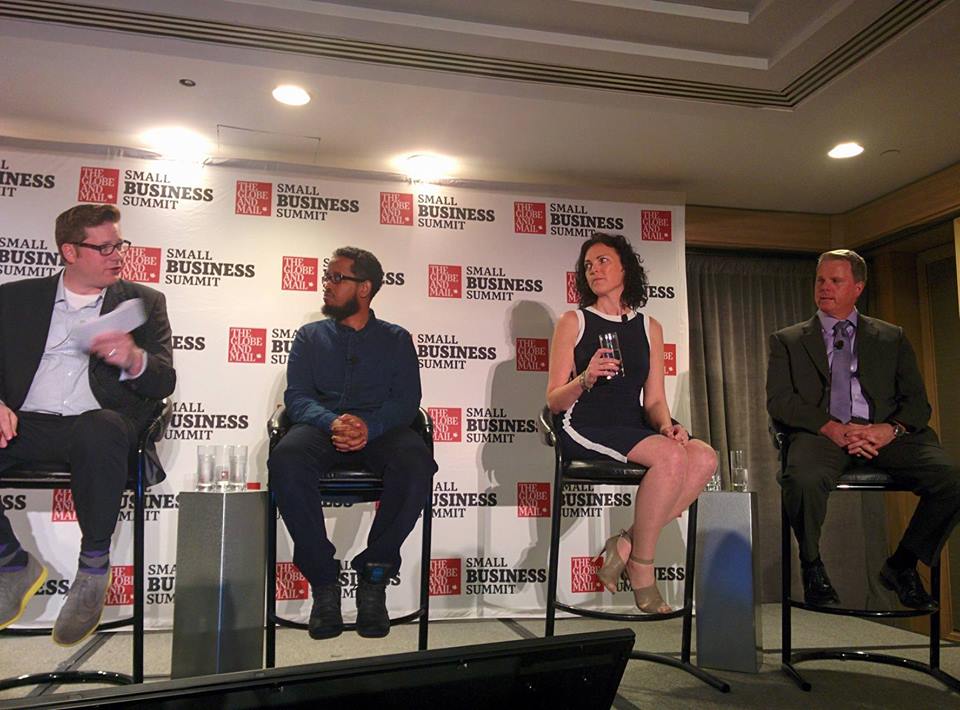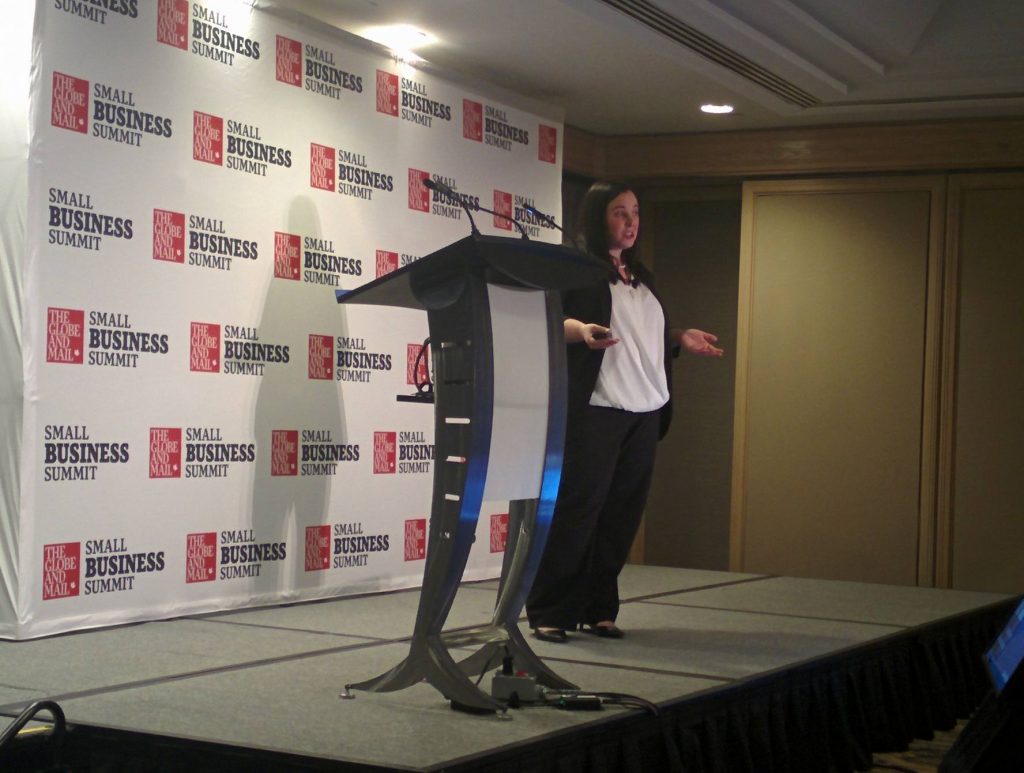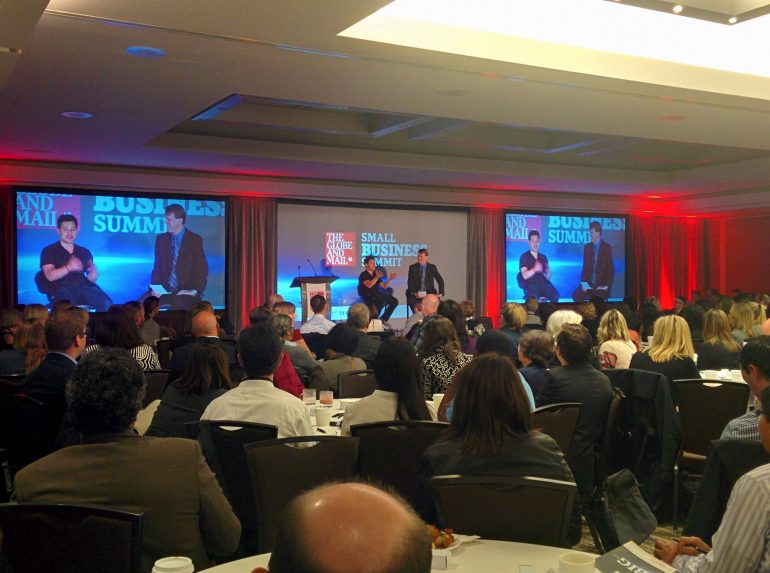Harley Finkelstein, Shopify’s passionate COO, kicked off The Globe and Mail’s Small Business Summit important point that summarized a lot of the thinking behind most Canadian entrepreneurship conferences: that starting a successful business today goes beyond having access to capital.
“Something happened in the last ten years where no longer is capital the most important thing. If you wanted to get your product into the hands of millions of people around the world, ten or 20 years ago you had to go to Best Buy or Wal-mart and convince a retail buyer to put your product on the shelves,” Finkelstein said. “Now, the Internet gives you distribution all over the world. Today, if you want to raise a money for a prototype, you can go on a crowdfunding platform. If you want to create a prototype, you can use a 3D printing machine, you don’t have to go to China.”
During the jam-packed day, Canada’s top entrepreneurs from across the country spoke to how technology today enables business to thrive that wouldn’t survive twenty years ago — and how larger enterprises or fellow startups could keep up. Much of the morning featured speakers and panelists who could share insights on every stage of the business, from the early days when companies may consider crowdfunding, to looking back on mistakes made as a larger company.

As Shopify went public a year ago, Finkelstein could relate both to the struggle of staying innovative as a startup and maintaining that culture as a larger public company. Part of maintaining culture, he says, is staying as transparent as you started; one way the company does this is through hosting an “Ask Me Anything” session with Shopify executives every Friday, where employees ask questions and upvote the top issues.
“Many people think that transparency is a team email once a year or a month,” Finkelstein said. “We want people to understand what we’re thinking about and give them a sense of what our roadmap is and what keeps us up at night. I think transparency and being candid with your team allows you to scale culture.”
Describing going public like “graduation”, Finkelstein said that the experience allowed them to hire more senior talent more comfortable with working at a public company, and that the executive team remained dedicated to keeping the company “sheltered” from the short-term pressure quarter-to-quarter. When asked by the audience what resources that entrepreneurs can turn to for support, Finkelstein mentioned that there is a wealth of resources now than when he started, including BetaKit. “I think it’s much easier today, BetaKit didn’t exist in 2010. MaRS was just getting set up here in Toronto. There’s probably more startup technology meetups in Toronto than I can even count on one hand. It’s easier to find these meetups and find your tribe when you’re getting set up.”
Finkelstein said that the company continues to hire for potential, not experience. “We find the ‘life story’ question valuable because what we’re looking for is the person who got deep into something; someone who saw a problem and got deep into it and understood the entirety of problem. We want the person who started a charity, not worked for a charity.”

The latter issue is something that Communitech’s program talent manager Andrea Gilbrook spoke on during her talk, Hiring the Best Technical Talent. She said that 38 percent of large companies last year reported having difficulty hiring for their roles, and part of the reason was that companies didn’t have a strong employee value proposition. Attracting the right talent is about understanding the characteristics about a company’s top performers and why they stay, and going beyond the boring list of job descriptions — companies should be candid both about the best and worst parts about the job.
“It’s the compelling reasons why a talented person would want to work for you. It’s not the ping pong tables, it’s not the comp and benefits, it’s not those things that are tangible,” she said. “It’s about the entire experience you’re looking for when you got to work.”
For the smaller companies just trying to figure out how to secure funding, one of the morning panels hosted by The Globe’s technology reporter Shane Dingman — featuring Robleh Jama, founder at Tiny Hearts; Jillian Bowman, founder and CEO of Epicured Market; and Don McDonald, CEO of Waverley Corporate Financial Services — focused on crowdfunding. The panelists touched on how to figure out if crowdfunding was right for your business, and how to make it successful. “Do you have a compelling story? Are you solving a problem felt by most people? Because you’re reaching out to total strangers. If you have niche market you need to figure out if going to the crowd is even the best decision.” Bowman said.
Jama said that the company found success in crowdfunding for its Next keyboard largely because they had a mobilized a group of early adopters willing to fund the campaign before it even started, and came up with out-of-the-box ways to raise awareness like sending poop emoji mugs to journalists. “I would do it again for hardware and not software. Software has difficulty in terms of distribution, and we had a lot of issues we had to deal with,” Jama said, looking back at his experience.
“The equity crowdfunding model in Canada is very new,” said McDonald. “We’re about five years behind the UK. We need some success stories i would love for us to be a burgeoning source of capital for young companies, but for that to happen we need people to get out of bed in the morning and say ‘Hey, I’m going to go buy securities in a private company today on the Internet. We’re not there yet, but probably we’ll see a lot of failures before we see successes which is a big risk.”
But as Finkelstein said at the top of the event, it’s the willingness to embrace failure and learn from it that builds the foundation for successful business. Just this morning, Shopify reported 95 percent increase in revenue YoY as it moves toward mobile.
“Most mistakes that we make from a company perspective, we kind of look at them as failure is the successful identification of something new and insightful,” Finkelstein said.


